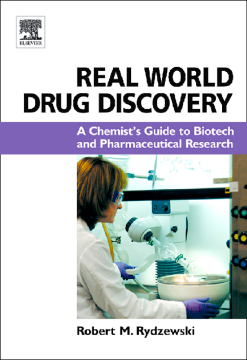
Additional Information
Book Details
Abstract
Drug discovery increasingly requires a common understanding by researchers of the many and diverse factors that go into the making of new medicines. The scientist entering the field will immediately face important issues for which his education may not have prepared him: project teams, patent law, consultants, target product profiles, industry trends, Gantt charts, target validation, pharmacokinetics, proteomics, phenotype assays, biomarkers, and many other unfamiliar topics for which a basic understanding must somehow be obtained. Even the more experienced scientist can find it frustratingly difficult to get an overview of the many factors involved in modern drug discovery and often only after years of exploring does a whole and integrated picture emerge in the mind of the researcher.
Real World Drug Discovery: A Chemist’s Guide to Biotech and Pharmaceutical Research presents this kind of map of the landscape of drug discovery. In a single, readable volume it outlines processes and explains essential concepts and terms for the recent science graduate wondering what to expect in pharma or biotech, the medicinal chemist seeking a broader and more timely understanding of the industry, or the contractor or collaborator whose understanding of the commercial drug discovery process could increase the value of his contribution to it.
- Interviews with well-known experts in many of the fields involved, giving insightful comments from authorities on many of the sub-disciplines important to cutting edge drug discovery.
- Helpful suggestions gleaned from years of experience in biotech and pharma, which represents a repository drug discovery "lore" not previously available in any book.
- "Periodic Table of Drugs" listing current top-selling drugs arranged by target and laid out so that structural similarities and differences are plain and clear.
- Extensive use of diagrams to illustrate concepts like biotech startup models, preteomic profiling for target identification, Gantt charts for project planning, etc.
BRITISH TOXICOLOGY SOCIETY NEWSLETTER, Summer 2010 issue: "[I]lluminating and stimulating, as the author uses examples to demonstrate how the challenge of making new, profitable, drugs has changed in the last few years, as well as the shape of pharmaceutical companies themselves…. The relaxed writing-style of the author makes this book both very easy to read and enjoyable, while at the same time peppering the reader with new facts. Whereas the book is labeled as a chemist’s guide, I suspect that it would be of use to many people entering the drug discovery arena, be they chemists or not… Robert Rydzewski has succeeded in producing a text that will find its way onto the shelves of many early career-stage scientists, and I think they will be considerably improved by reading it." — Nick Plant, Centre for Toxicology, University of Surrey, UK
JOURNAL OF MEDICINAL CHEMISTRY, Volume 53, number 4: As explained in his preface, the purposes of [the author’s] treatise are to present new researchers "with a basic overview of how modern industrial drug discovery works", to introduce the relevant scientific disciplines, and "to provide some practical insights into common problems in drug discovery", and possible solutions. In my opinion, he has achieved these goals in an excellent manner. …This book is enthusiastically recommended to graduate faculty and students, to postdocs, recent graduates, young workers in the pharma industry, to anyone who would like a one-volume review of modern industrial drug discovery, and to the libraries that serve these groups. — Manfred E. Wolff, Intellepharm, Inc.
CHOICE, April 2009: "More than a primer, this book serves as an excellent introduction to research in industry in general and the pharmaceutical industry in particular, as well as a career resource ... Of particular interest to chemistry graduate students as well as research-orientated undergraduates and their mentors. Summing Up: Highly recommended." — R. E Buntrock, formerly, University of Maine
